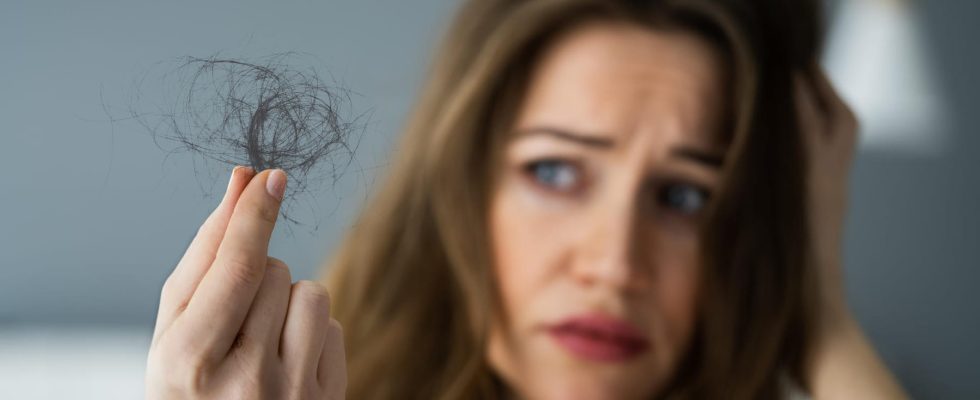Constant stress disrupts the hair cycle. The consequences can be thinning or hair loss. How you can escape the vicious circle.
Psychological stress has a negative effect on the entire body. Appetite often suffers as well. This means, among other things, that people pay less attention to a healthy, balanced diet when they are stressed. The result: the hair lacks nutrients and falls out. How else stress affects hair and what you can do.
How much hair loss is normal?
How much hair falls out each day varies from person to person. Most people know how much loose hair to expect in the brush, shower drain, or pillow. If there are suddenly more, it can be worrying.
“Whether the amount of hair lost is perceived as hair loss depends on the individual hair turnover and personal feeling,” says Dr. Uwe Schwichtenberg, dermatologist from Bremen and member of the Professional Association of German Dermatologists. V. (BVDD). “As a guideline, hair loss of 50 to 100 hairs per day is normal.”
Cause of hair loss: Stress can take its toll on the hair
There are various causes of hair loss. In addition to genetic factors – hereditary hair loss is a common trigger for increasing hair loss – nutrient deficiency, iron deficiency, a weakened immune system and stress are among the negative influencing factors that can weaken the hair roots. “When hair loss is caused by stress, the picture is diffuse hair loss. This means that more hair comes loose from the scalp all over the head,” explains the hair expert. “The hair becomes thinner overall.”
After stress: Diffuse hair loss usually regenerates
Since stress-related hair loss often only becomes apparent a few months after the stress phase, many of those affected do not associate it with the past additional stress. When it comes to diffuse hair loss, you should always look into the past. “Stress-related, diffuse hair loss usually appears three to nine months later, due to the natural hair cycle,” says Schwichtenberg.
The good news is: Unlike hereditary hair loss, diffuse hair loss usually regenerates once the triggering factor, i.e. the stress phase, has passed.
Dr. med. Uwe Schwichtenberg is a specialist in dermatology and allergology and head physician at the “Derma Nord” dermatology practice in Bremen. Dr. Schwichtenberg is a member of the federal board of the Professional Association of German Dermatologists. V. (BVDD) as well as editor and expert www.haarmedizin.de.
What does stress do to your hair?
On the one hand, there are the stress hormones that affect the hair roots – including increased cortisol levels in the blood. Cortisol inhibits hair growth. In addition, stress hormones can promote inflammatory processes in the hair roots, which promote hair loss.
On the other hand, under stress the supply of nutrients to the hair roots can be reduced, which can also increase hair loss. “If the body is under constant stress, it withdraws the necessary resources from where they are not needed so urgently – this is, among other things, upside down,” explains the dermatologist.
Unhealthy lifestyle when stressed
In addition, under stress, your lifestyle tends to take a turn in a rather unhealthy direction: you often sleep less, eat less healthily and may use more harmful substances, such as alcohol and cigarettes. All of these can weaken hair growth.
“If the hair follicle lacks important nutrients to adequately supply the hair roots, hair can fall out,” explains Schwichtenberg. “The hair needs a good supply of vitamins, minerals and trace elements in order to grow strong and healthy. In addition, prolonged stress weakens the immune system – which also promotes hair loss.”
Hair needs iron
Iron is an important nutrient for hair. According to the hair expert, iron deficiency is the most common cause of diffuse hair loss in young women. An iron deficiency can have various causes, for example frequent diets and malnutrition, a vegetarian or vegan diet with no iron-rich animal foods such as meat, but also heavy menstrual bleeding.
“Anyone who notices increased hair loss should always consult a doctor and have the cause clarified. The earlier therapy begins, the better the chances of preserving the hair,” advises Schwichtenberg. “In young women with hair loss, the body’s iron stores should always be checked.”

